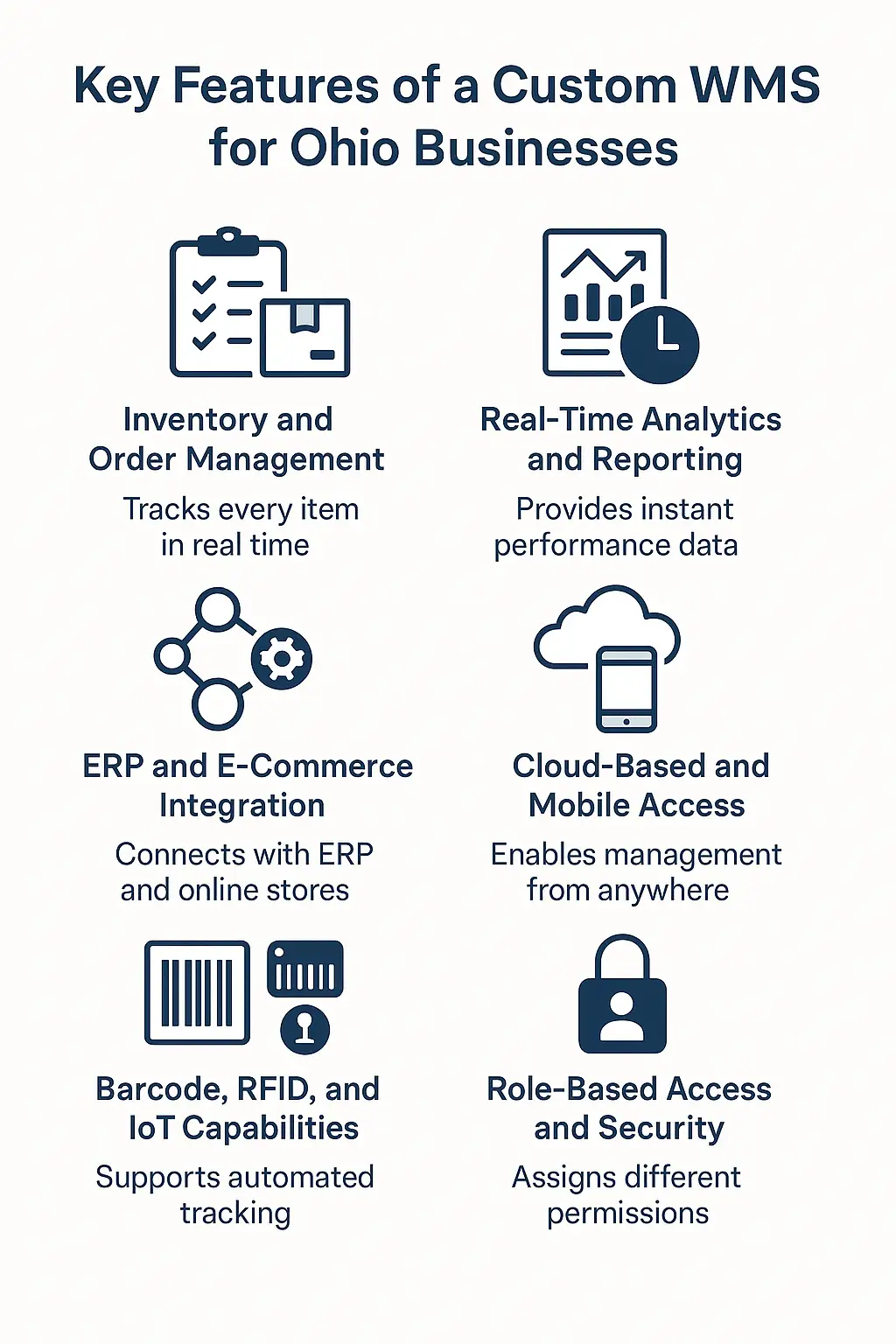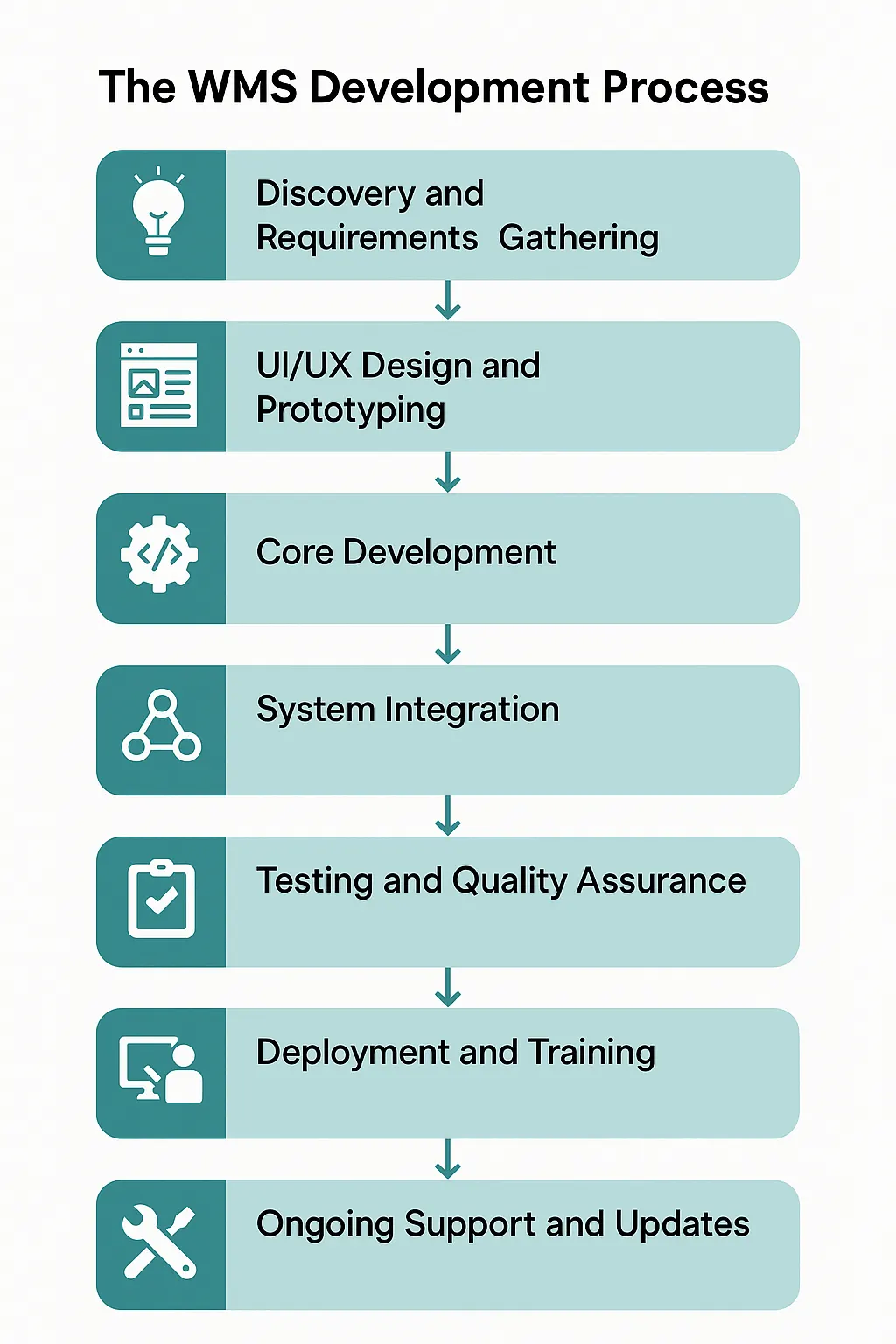Running a warehouse in Ohio comes with unique challenges. Manufacturers, distributors, and logistics providers must balance rising customer expectations, labor shortages, and the need for accurate, real-time data. Many businesses still rely on outdated systems like spreadsheets or basic software, and these tools make it harder to keep up with today’s fast-moving supply chains. As operations grow, those systems create more problems than they solve.
That’s where a custom Warehouse Management System (WMS) makes a difference. A WMS built for your business improves efficiency, reduces errors, and streamlines daily tasks. Instead of trying to adapt to generic off-the-shelf software, Ohio businesses can work with local developers to create a solution tailored to their exact needs. Whether it’s handling complex inventory, managing multiple warehouse locations, or integrating with ERP and e-commerce systems, a custom WMS can support growth while saving time and money.
Ohio businesses also gain an advantage by working with developers who understand the local market. A custom solution can handle industry-specific demands, whether you run a manufacturing plant in Cleveland, a distribution center in Columbus, or a logistics hub near Cincinnati. With features like cloud-based access, mobile apps, and advanced automation, businesses across Ohio can future-proof their warehouse operations and stay competitive.
This complete guide will walk you through the benefits of custom WMS development, the key features to consider, and the steps to building a system that works for Ohio businesses today and in the future.
What is a Custom Warehouse Management System (WMS)?
A Warehouse Management System (WMS) is software that helps you run your warehouse more efficiently. It tracks inventory, manages orders, and improves the flow of goods from storage to delivery.
A custom WMS goes one step further. Instead of using generic software, developers build the system around your exact business needs. Ohio manufacturers, distributors, and logistics providers get features designed for their unique workflows.
With a custom WMS, you decide what matters most. You can manage inventory in real time, connect the software with your ERP or e-commerce platforms, and create mobile apps for your warehouse staff. The system adapts to your business, not the other way around.
Unlike off-the-shelf solutions, custom WMS development in Ohio gives you control. You choose the features, integrations, and automation tools that fit your warehouse. This flexibility makes the system easier to use and more valuable over time.
For Ohio businesses, a custom WMS means better accuracy, faster order fulfillment, and smarter use of resources. It supports growth by scaling with your operations and aligning with local industry needs.
Why Ohio Businesses Need Custom WMS Solutions
Ohio’s manufacturing, distribution, and logistics industries face constant pressure to improve speed, accuracy, and efficiency. Many warehouses still rely on outdated tools like Excel or basic software, which creates bottlenecks and costly errors. A custom Warehouse Management System (WMS) solves these challenges and supports long-term growth.
Tailored to Local Workflows
A custom WMS fits directly into your warehouse workflows. Unlike off-the-shelf software that forces teams to adapt, a tailored system aligns with the way Ohio businesses already operate. This flexibility helps employees adopt the system quickly and reduces errors on the warehouse floor.
Real-Time Inventory Control
Real-time inventory control is another major advantage. Ohio manufacturers often deal with large inventories and complex product lines, which makes tracking difficult. A custom WMS gives full visibility into stock levels and improves order accuracy, so teams reduce waste and fulfill customer requests faster.
Seamless Integrations
Integrations also play a key role for distributors and logistics providers in Ohio. Many companies rely on ERP, accounting, and e-commerce platforms to manage operations. A custom WMS connects seamlessly with these systems, eliminates duplicate data entry, and ensures that information flows smoothly across departments.
Scalability for Growth
As businesses grow, scalability becomes essential. Ohio companies expanding into new markets or adding product lines need systems that grow with them. A custom WMS makes it possible to add features like mobile apps, cloud access, RFID tracking, or automation without replacing the entire system. This saves time and prevents costly transitions.
Local Expertise and Support
Local expertise is another benefit for Ohio businesses. Partnering with Ohio-based WMS developers ensures faster support and solutions that reflect the realities of the local market. Developers who understand regional challenges can build software that addresses the specific needs of manufacturers, distributors, and logistics providers across the state.
Key Features of a Custom WMS for Ohio Businesses

A custom warehouse management system (WMS) gives Ohio businesses the tools they need to run faster, smarter, and more efficiently. Unlike off-the-shelf software, a custom WMS fits your exact operations. Here are the key features that make it a game-changer for manufacturers, distributors, and logistics providers in Ohio.
1. Inventory and Order Management
A custom WMS tracks every item in real time. It reduces errors, prevents stockouts, and speeds up order fulfillment. Ohio warehouse managers no longer need to rely on Excel or manual logs. The system keeps your inventory accurate and your customers happy.
2. Real-Time Analytics and Reporting
Ohio businesses gain instant access to performance data with a custom WMS. You can see inventory trends, track order accuracy, and measure labor productivity. Real-time reports help you make smarter decisions and respond quickly to market changes.
3. ERP and E-Commerce Integration
A custom WMS connects seamlessly with your ERP, accounting, or e-commerce systems. Ohio distributors can integrate QuickBooks, Shopify, or other platforms without manual entry. This integration eliminates duplicate work and keeps your entire business in sync.
4. Cloud-Based and Mobile Access
With a cloud-based WMS, Ohio business owners can manage warehouses from anywhere. Mobile WMS apps allow staff to update inventory on the floor in seconds. This flexibility improves communication, speeds up workflows, and reduces downtime.
5. Barcode, RFID, and IoT Capabilities
Custom warehouse software for Ohio companies can use barcode scanners, RFID tags, and IoT devices. These tools improve accuracy, speed up inventory tracking, and reduce labor costs. Automation makes your warehouse more efficient and less dependent on manual tasks.
6. Role-Based Access and Security
A WMS with role-based access keeps sensitive data safe. Ohio businesses can assign different permissions to managers, floor staff, and executives. This feature protects information while keeping operations transparent and organized.
The WMS Development Process

Developing a custom warehouse management system in Ohio follows a clear and practical process. Each step helps your business move from outdated tools to a reliable, scalable solution.
1. Discovery and Requirements Gathering
We start by learning about your warehouse operations. Our team meets with your managers, operators, and decision-makers in Ohio to understand your workflows. We identify gaps, challenges, and goals. This step ensures the custom WMS matches your exact needs.
2. UI/UX Design and Prototyping
We design user-friendly dashboards and mobile screens. The goal is to keep your staff productive with simple, intuitive layouts. You review prototypes early, so we can refine the look and feel before coding begins.
3. Core Development
Our developers build the WMS using modern frameworks and scalable technology. We create modules for inventory tracking, order management, and real-time reporting. Each feature focuses on accuracy and speed, so your team works smarter every day.
4. System Integration
We connect your new WMS with your ERP, accounting tools, and e-commerce platforms. Whether you use QuickBooks, NetSuite, or Shopify, we ensure smooth data flow. This integration saves time, reduces errors, and gives you a single source of truth.
5. Testing and Quality Assurance
We test every feature under real warehouse scenarios. Our team checks performance, data accuracy, and security. We fix issues before launch, so you get a stable system that performs from day one.
6. Deployment and Training
We install the system and help your Ohio team adopt it quickly. We provide training for managers, staff, and admins. With step-by-step guidance, your employees feel confident using the new software.
7. Ongoing Support and Updates
We stay with you after launch. Our support team handles questions, monitors performance, and delivers updates. As your warehouse grows, we scale your system to match new demands.
A structured development process ensures your custom WMS solution in Ohio works smoothly from planning to daily use. By following these steps, we help your business improve efficiency, reduce costs, and future-proof operations.
Case Examples: How Custom WMS Helps Ohio Businesses
Case Example 1: Ohio Manufacturer Reduces Errors
An Ohio-based manufacturer struggled with frequent inventory errors because employees tracked stock in Excel. The company decided to build a custom warehouse management system. The new system automated data entry, integrated with their ERP, and gave managers real-time visibility into inventory. As a result, the manufacturer cut order errors by 40% and improved delivery times across Ohio.
Case Example 2: Distributor Improves Efficiency with Cloud-Based WMS
A mid-sized distributor in Columbus relied on outdated software that slowed down order processing. They worked with WMS software developers in Ohio to create a cloud-based solution. The system included mobile apps for warehouse staff, barcode scanning, and real-time order tracking. After launch, the distributor processed 25% more orders per day and scaled operations without hiring extra staff.
Case Example 3: Logistics Provider Gains Competitive Edge
A logistics provider in Cleveland wanted to stand out in Ohio’s fast-growing supply chain industry. They invested in custom WMS development with IoT and RFID integration. The system allowed clients to track shipments in real time and reduced delays in their warehouses. The provider gained new contracts because customers valued the transparency and speed their custom WMS delivered.
How to Choose the Right WMS Development Partner in Ohio
Choosing the right partner for custom WMS development in Ohio can make or break your project. You need a team that understands both technology and the realities of warehouse operations. Here are a few things to look for:
1. Look for local expertise.
Work with WMS software developers in Ohio who know the challenges of the state’s manufacturing and logistics industries. Local partners respond faster, understand compliance rules, and bring insights from working with other Ohio businesses.
2. Check industry experience.
Ask if the team has built warehouse management system development projects for manufacturers, distributors, or logistics providers. A partner with real industry experience designs software that solves day-to-day warehouse problems, not just generic workflows.
3. Evaluate their customization approach.
A good partner listens first and builds later. They should map your processes and create custom warehouse software that matches your needs instead of forcing you to change how you work.
4. Ensure strong integration skills.
The right developers connect your new WMS with ERP, accounting, or e-commerce systems. Look for proven work in ERP and WMS integration and cloud-based WMS Ohio projects.
5. Ask about mobile and automation features.
Modern Ohio warehouses need mobile WMS apps, barcode scanning, and sometimes even RFID or automation tools. Make sure your partner can add these features as your business grows.
6. Look for long-term support.
A custom WMS is not a one-time project. Your partner should offer updates, training, and ongoing support. This ensures your system stays reliable as your warehouse scales.
Conclusion
Custom WMS development gives Ohio businesses the tools to run smarter, faster, and more efficiently. Manufacturers, distributors, and logistics providers in Ohio gain full control of their warehouses when they move away from spreadsheets and outdated systems. A custom warehouse management system fits your exact workflow instead of forcing you to adapt to generic software.
With the right development partner, you can build an Ohio warehouse management software solution that grows with your business. You can integrate your WMS with ERP systems, accounting tools, and e-commerce platforms to create a connected operation. Cloud-based WMS solutions keep your data secure and accessible, while mobile WMS apps let your team work from anywhere on the floor.
Ohio businesses that invest in warehouse automation and custom warehouse software see fewer errors, lower costs, and faster order fulfillment. Operations leaders no longer waste time on manual tasks, and business owners see a clear return on investment.
If you run a warehouse in Ohio and want to improve efficiency, now is the time to consider custom WMS development. You can partner with experienced WMS software developers in Ohio who understand local industry needs. Start by exploring how a tailored WMS for manufacturing or logistics software development in Ohio can give you a competitive edge.
